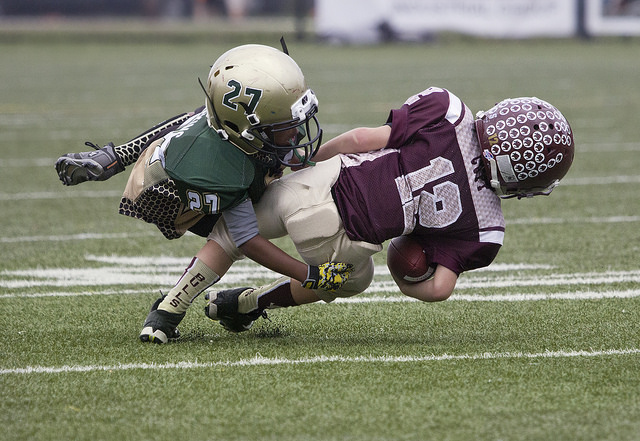It’s now no secret that the hits most NFL players sustain during football games could lead to chronic traumatic encephalopathy, the degenerative brain disease known as CTE that causes memory loss, aggression, confusion and more.
But it’s not just those tackles in a national stadium that can put a player at risk. Playing youth football before the age of 12 could lead to an earlier onset of the cognitive and emotional symptoms associated with CTE, according to a new report.
Researchers at Boston University School of Medicine and VA Boston Healthcare System released a new study this week looking at 211 football players who were diagnosed with CTE after death, and the effects of youth football on that outcome.
Those who began playing tackle football before 12 saw CTE symptoms appearing an average of 13 years earlier than those who didn’t.
Every year younger that someone began to play football predicted earlier onset of cognitive issues, like memory loss, by 2.4 years and behavioral and mood problems, like aggression and depression, by 2.5 years, according to the report.
Though playing football at a younger age was associated with these symptoms appearing earlier, it wasn’t associated with a more severe form of CTE. The main finding was that starting tackle football at a younger age influences when those symptoms first appear, and also puts players at risk of other brain diseases, like Alzheimer’s and dementia.
“Youth exposure to repetitive head impacts in tackle football may reduce one’s resiliency to brain diseases later in life, including, but not limited to CTE,” said Ann McKee, MD, chief of Neuropathology at Boston VA Healthcare System and Director of BU’s CTE Center, in a statement. “It makes common sense that children, whose brains are rapidly developing, should not be hitting their heads hundreds of times per season.”
Of the 211 CTE-diagnosed brains studied, 76 were amateur football players and 135 played at the professional level. The brains were donated to the VA-BU-Concussion Legacy Foundation Brain Bank. Researchers conducted phone interviews with the friends and families of those players to determine if they displayed such cognitive, behavior and mood symptoms and when they first began.



















